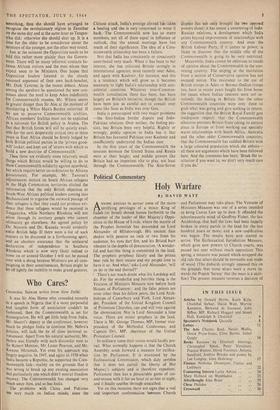Who Cares?
CHANCHAL SARKAR writes from New Delhi: It was Sir Alec Home who conceded recently In a speech in Nigeria that if a more purposeful and tangible form of association couldn't be fashioned, then the Commonwealth is set for disintegration. He will get little help from India. Mr. Shastri's deputy at the conference, however much he pledges India to continue Mr. Nehru's Policies, will lack the tie of close personal in- volvement. Apart from his natural authority, Mr. Nehru was friendly with such dissimilar men as Sir Robert Menzies, Mr. Lester Pearson, and Mr. kwame Nkrumah. Yet even his approach was largely negative. In 1947, and again in 1950 when India became a Republic, he supported the Corn- Monwealth link—mainly on the grounds that it Was wrong to break up any existing association and particularly one which didn't restrict freedom anyway. The Commonwealth has changed very Much since then, and so has India.
The problems with China and Pakistan are very much on Indian minds; since the
Chinese attack, India's prestige abroad luts taken a beating and she is very concerned to wrest it back. • The Commonwealth now has so many members, not all of them equal in influence or outlook, that the 'annual meetings have lost much of their significance. The idea of a Com- monwealth citizenship has been a failure.
Not that India has consistently or consciously contributed very much. When it has been to her interest, she has criticised Britain strongly in international agencies; most recently over Aden, and again with Kashmir, for instance, and this is a tendency which will grow as it becomes necessary to right India's relationship with anti- colonial countries. Whatever inter-Common- wealth consultation there has been, has been largely on Britain's initiative, though the British have been just as careful not to consult over items like Suez as India was over Goa.
India is preoccupied with two major problems —the Sino-Indian border dispute and Indo- Pakistan relations. Over neither, the feeling per- sists, has Britain been very helpful. Rightly or wrongly, public opinion in India has it that Britain has favoured Pakistan over Kashmir and insufficiently understood the Indian case.
In the first years of the Commonwealth the tensions between the United States and Russia were at their height; and middle powers like Britain had an important role to play, not least through the Commonwealth., The Sino-Soviet dispute has not only brought the two opposed powers closer; it has meant a sweetening of Indo- Russian relations, a development which India prizes beyond improvement of relationships with any Commonwealth country. And even the British Labour Party, if it comes to power, is likely to discover that the middle role of the Commonwealth is going to be very restricted.
Meanwhile, India cannot be oblivious to trends of opinion about the Commonwealth in the con- vening country. The sniping at the institution from a section of Conservative opinion has not escaped notice. The resistance to the use of British troops in Aden or Borneo (Indian troops too, have in recent years fought far from home for issues where Indian interests were not in- volved); the feeling in Britain that the other Commonwealth countries were only there to grab what was going and give nothing in return; the suggestion that the British Royal Family gets inadequate respect; that the Commonwealth albatross prevents Britain from taking its natural place in Europe or from working out specially warm relationships with South Africa, Australia and the other older Commonwealth countries; that the Commonwealth has saddled Britain with a large coloured population which she abhors— all these are arguments which have been followed here. And the consensus has been, 'Break the in- stitution if you want to, we don't very much care if you do.'






























 Previous page
Previous page